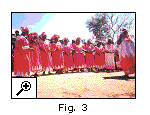|
|
 |
|
| |
Zambia
After a meeting of local chiefs in 1996 and a campaign to build awareness of fishing gear and fishing practices in the years 1997-1998, Zambia began its EE program by establishing Village Conservation and Development Committees (VCDC). They decided to train these committees in their role within the villages regarding conservation issues and to try to build their capacity to plan their own conservation and development programmes.
The Zambia TEEC team conducted a series of workshops aimed at fulfilling a perceived need for training the VCDC members in their roles and ensuring that the VCDCs had a Term of Reference to work towards in the conservation and development of their livelihoods around the lakeshore. Two workshops were held on the Eastern Lakeshore, at Chipwa (close to Tanzanian border) and Chisanza. Each Workshop had up to 10 members of 3 Village Conservation and Development Committees (VCDC) from Stratum One of five in Zambia. 
In Zambia, as the rest of the training of Stratum One is now complete and by the time the LTBP ends, all Stratum Committees will be trained. The VCDCs are being encouraged to plan small programmes within their villages that do not rely on outside funding at present. The second phase of their work is to follow up these workshops with visits to monitor the effectiveness of the training and how far the villages have been able to plan and implement small programmes.
In addition to these national work plans, the LTBP EE teams also supported other national activities in environmental education. The Tanzanian and Burundian teams, for example, campaigned to build awareness about the lake and its issues at national World Environment Day celebrations (Fig. 3).
|
|